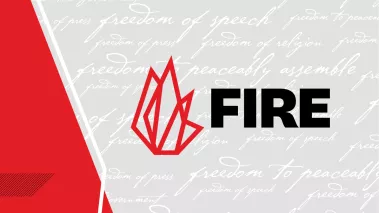Table of Contents
The State of Free Speech on Campus: Emory University

Throughout the spring semester, FIRE is drawing special attention to the state of free speech at America's top 25 national universities (as ranked by U.S. News & World Report). Today we review policies at Emory University, which FIRE has given a red-light rating for restricting free expression on campus.
We start by examining whether Emory—a private institution—has made any commitments to free expression that would lead students and faculty to believe they are entitled to free speech at the university. One such commitment is found in the university's Discriminatory Harassment Policy, which provides that
Emory University abides by the values of academic freedom and is built on the assumption that contention among different views is positive and necessary for the expansion of knowledge, both for the University itself and as a training ground for society at large. Emory is committed to the widest possible scope for the free circulation of ideas. (Emphasis added).
In addition, it is a violation of Emory's Undergraduate Code of Conduct to interfere with "the rights of others to free expression." (Emphasis added).
And yet Emory's own policies do precisely that. For example, students in Emory's residence halls are prohibited from engaging in any "acts of intolerance," which include all "use of epithets or names in a derogatory manner." In 2003, a similar prohibition on "acts of intolerance" in Shippensburg University's speech code was found by a federal judge to be unconstitutionally overbroad:
The amorphous term, "acts of intolerance" ... can be reasonably interpreted to encompass speech, not just conduct, that intimates intolerance. So construed, the provision of the Code prohibiting acts of intolerance directed at others, which by its terms provides that it is not limited to the examples of prohibited acts cited therein, could certainly be interpreted as prohibiting speech that is protected by the First Amendment.
Bair v. Shippensburg Univ., 280 F. Supp. 2d 357, 370 (M.D. Pa. 2003) (emphasis in original).
In addition to relying on a term found unconstitutional by a federal court, Emory's policy gets even worse. In a frightening grant of unfettered discretion, the policy states that "The Office of Residence Life and Student Conduct have the sole right to determine what is considered an [Act of Intolerance]." With this addition, this policy not only explicitly prohibits protected expression (simple name-calling, such as the use of "names in a derogatory manner," is largely protected), it also leaves students at the mercy of university administrators to decide what else might be punishable. The policy's grant of "sole discretion" to residence life administrators means that students can NEVER know what speech will be punished, since at any moment administrators might exercise their discretion to decide that a particular expression was out of bounds. As a result, this policy chills speech in Emory's residence halls, a place where dialogue among students should be at its freest.
The same Emory residence hall policy also prohibits "discriminatory harassment." While the actual definition of discriminatory harassment is reasonable, the policy goes on to contradict itself by prohibiting certain types of expression outright, regardless of whether they rise to the level of actual harassment: "Such conduct includes but is not limited to, objectionable epithets, demeaning depiction or treatment, and threatening or actual abuse or harm." The reality is that however unpleasant most "demeaning depictions" may be, they are protected by the First Amendment; satire and parody, for example, frequently work by demeaning their targets, and yet they are socially important forms of speech that are entitled to strong First Amendment protection.
Emory's Information Technology Conditions of Use policy also threatens free speech on campus. The policy provides that any electronic communication "that is perceived by its recipient as sexual or discriminatory harassment as defined by University policy may be considered a violation." By defining impermissible speech exclusively in terms of its effect on the recipient, this policy leaves Emory students at the mercy of the most sensitive members of the community. Precisely to avoid this outcome, the legal definition of harassment includes both a subjective (must be perceived by the victim as harassment) and an objective (must be offensive to a reasonable person in the victim's position) element; only if conduct is both objectively and subjectively harassing is it unprotected by the First Amendment. Additionally, Emory's policy states that "[t]he display of offensive material in any publicly accessible area is likely to violate University harassment policy," but provides no definition of "offensive." There are a lot of legitimate, and perhaps even important, materials that students and faculty may be accessing that others might find offensive. This policy opens the door to allegations of "harassment" based on entirely subjective feelings of offense. If this sounds like an overstatement, just take a look at FIRE's case at Indiana University–Purdue University Indianapolis, where a student-employee was found guilty of racial harassment for reading, in the break room in front of his co-workers, a historical book about a fight between Notre Dame students and the Klan—simply because some of his co-workers found any mention of the Klan offensive.
By maintaining these policies, Emory is chilling free speech on its campus and disregarding the commitments it has made to freedom of expression. Stay tuned next week for information on the state of free speech at Rice University.
Recent Articles
FIRE’s award-winning Newsdesk covers the free speech news you need to stay informed.

AI is new — the laws that govern it don’t have to be

Defending free speech: FIRE and Substack partner to protect writers in America

Brown University targets student journalist for sending DOGE-like emails
